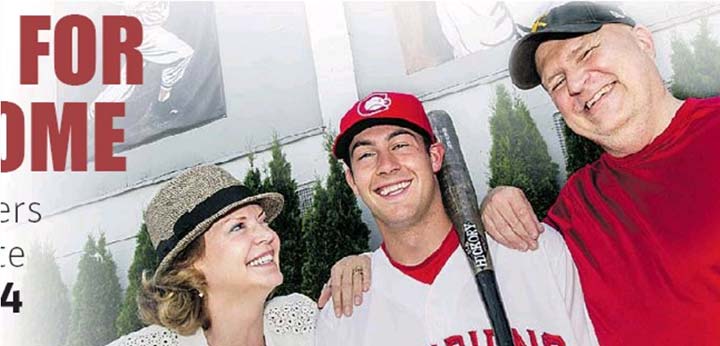

This is a love story about an artist, a tax lawyer and baseball. It's about Jennifer Ettinger, who still takes a ball glove to her third-base seats at Nat Bailey Stadium after ditching a promising career in computing to go to art school and become a painter -- mainly of famous baseball players, most of them dead.
And it's about Max Weder, who chose McGill University for law school back in the early 1980s so he could attend Expos' games in Montreal, where he learned to speak French by watching Tim Raines and Andre Dawson and Gary Carter on Radio-Canada.
Married for 31 years, Ettinger, 54, and Weder, 56, love baseball so much that six years ago they opened their Mount Pleasant home to ball players, lodging Vancouver Canadians as part of the Northwest League team's billet program.
"I really just call them my Canadian mom and dad now," catcher Seth Conner, a polite 22-year-old from Springfield, Mo., says. "I'm really close to them. Max and Jen feel like family. They take care of me, will do anything to help my career and me as a person. I'm a family-oriented guy. My family is important to me, so it is huge that you have people who care for you for more than just your skills on the baseball field.
Conner is so much like family that this past Wednesday, as the Canadians' team bus arrived after an overnight trip for games in Salem, Ore., Weder was waiting outside the stadium at 4:30 a.m. to drive their adopted player to their home near Ontario Street and 14th so that Conner could get a few extra minutes sleep before Vancouver's home opener that night at Scotiabank Field.
Conner could have caught a ride home on the Canadians' shuttle bus.
"Sometimes I get up that early anyway," Weder says. "I would say at least seven or eight of the families do it. It's almost like your own community. I always thought smokers were cool because they congregated and had these secret conversations. So we sit here, waiting for the guys to show up. I play Frisbee with my dog at 4:30 in the morning and she barks."
Weder and Ettinger were Canadian season-ticket holders before they became a billet family for the Toronto Blue Jays' short-season, Single-A farm team. Reproductions of Ettinger's paintings, vibrant portraits of players like Honus Wagner and Joe DiMaggio, Roberto Clemente and Jackie Robinson, loom like deities on the stadium's outer wall, above fans arriving at the ballpark.
Typically, Canadians' players ate 18-24 years old and just starting what they hope will be careers in professional baseball. Most are American. Some are far from home for the first time. A few have never seen real mountains.
The host families, some with children of their own at home, are clustered either relatively near Queen Elizabeth Park or on the North Shore. In return for lodging a player during the three-month season, families receive free tickets to games and a groceries stipend of $250 a month, which probably doesn't quite cover each player's consumption of milk and cheese.
The Blue Jays, who pay the players about $1,000 - $1,200 a month, deduct a housing fee from their salaries.
This is Conner's second season with Ettinger and Weder, who housed infielder-turned-pitcher Matt Johnson the last three years. Johnson is now out of baseball.
"I think it's a sense of family," Ettinger explains. "I get a sense of contributing to someone's life in a positive way. And I love baseball, so I get to share ideas on different positions.
"We weren't fortunate enough to have children, but we have nine godchildren. We have wonderful friends who love us and trust us enough to contribute to their children's lives. A lot of our godchildren are now in their 20s. We contribute in the same way for out ballplayers. We're there to guide; we're not there to judge."
But there are some house rules. Players are not allowed overnight "guests," although Conner's bride, Laura, will stay in July. Seth and Laura, a university student, were married last fall. Seth, who arrived in Vancouver halfway through last season, invited his Canadian parents to his wedding after knowing them for a month.
Weder, a partner in law firm Davis LLP, says lodging players is sometimes like taking in "instant teenagers" because many of them have experienced little outside of baseball. He and Ettinger act as tour guides, taking players up Grouse Mountain and on the ferry to Vancouver Island or the Sunshine Coast.
"The (rules) have never really come up,"Ettinger says. "But they're kind of given the riot act (by the club) before they come to our place. There was only one time Max had to go down and shut the party down. They were in the hot tub and we thought our neighbours might complain because it was about three in the morning. But these guys have to let loose a little sometimes, too.
"It's been a great experience. You are bringing people into your home that you don't know. But they have just been spectacular, so friendly, so nice, and most of them very interested in Vancouver and never been to another country. And I'm proud of where I'm from and want to share it with people."
The couple recently bought a property in Gibsons, which Jennifer will use as her art studio.
It was 1989 when, at age 29, she decided to follow her heart and go to the Emily Carr University of Art and Design. Her heart needed it because she lost both parents that year.
Her father, Ab, a former senior league player in Nova Scotia, instilled in Ettinger a love of baseball. She inherited her artistic genes from her mother, Ruth.
"At Emily Carr, I was hanging around with a lot of conceptual artists and feminists and doing a lot of political statements," Ettinger says. "And when I started painting ballplayers in a stylized form, I was criticized for that quite heavily because it's an aggressive pose - a guy with a bat. So I had to step up and say this was my intent. I used to defend myself. Now I just put it on the table and say 'this is what I do.'"
Max says "I thought it was great that somebody who had artistic talent since she was a kid would say: 'I'm dumping a paycheque for four years of art school.' And even as a successful painter, you're not making tons of money. What I bill in a day, she takes a month to create something and, if it's not a commission, then has to go out and sell."
Max grew up in Saskatoon, Jennifer near Digby, N.S.. they met at Acadia University in Wolfville, N.S.
The artist and tax lawyer may have disparate professions, but their shared love of baseball is obvious.
"They're awesome,' Conner says. "Max is a witty, smart tax lawyer. He's got quick remarks. Sometimes he catches me off-guard and it's like, OK, now I get it. And Jennifer is just a sweet, talented artist. For my wedding present, she gave me a mural of our whole stadium. It's just beautiful. They compliment each other really well."
"We totally need these families," Jeff Holloway, who co-ordinates the Canadians' housing program, says.
"They are the MVPs of the organization. It sounds kind of schmaltzy, but it's the love of a family that's most important. A lot of these players are from small towns in the U.S., some of them are away from home for the first time and Vancouver is a very different place than what they're used to. But they can still feel like they're part of a family."
